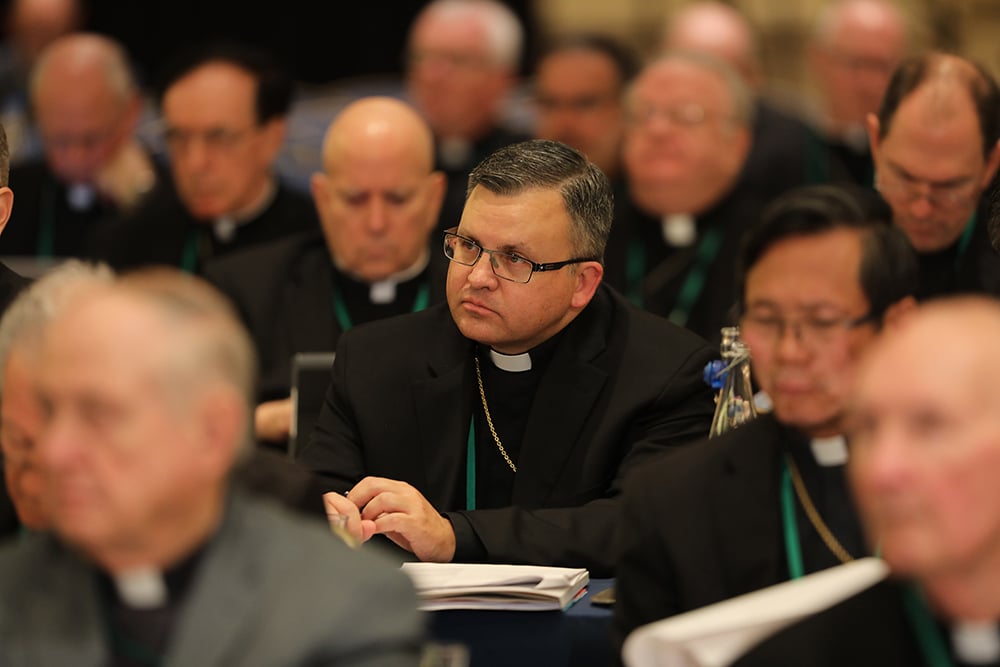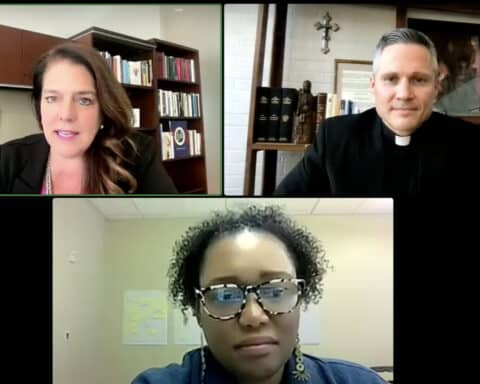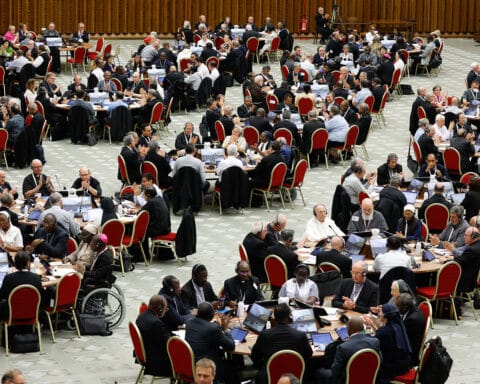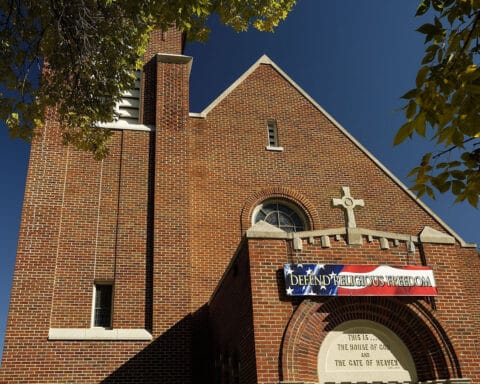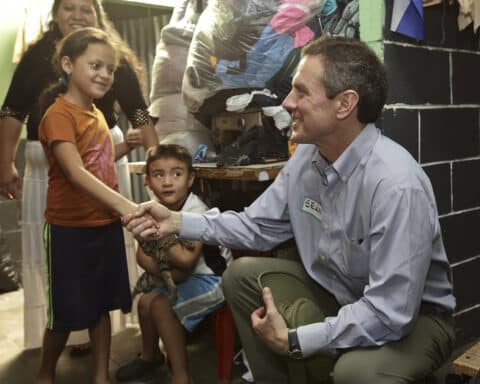In an action with historic significance, the U.S. bishops at their fall general assembly for the first time ever chose a Hispanic prelate to head their national conference. The vote came as they and the Church face mounting crises on multiple fronts.
Elected on the first ballot to a three-year term as president of the United States Conference of Catholic Bishops was Archbishop Jose H. Gomez of Los Angeles — with some 4.5 million Catholics, the largest Catholic see in the nation. He succeeds Cardinal Daniel DiNardo of Galveston-Houston after serving three years as vice president. Elected to succeed him as vice president was Archbishop Allen H. Vigneron of Detroit, who had been serving as secretary of the bishops’ conference.
As Archbishop Gomez, a native of Mexico who is a naturalized citizen, assumes the top job in USCCB, problems confronting the hierarchy include persistent tensions in their relations with Rome, continuing fallout from the sex abuse scandal, a rising number of defections from the Church, especially among young people, and now it seems a sharp drop even among U.S. Hispanics in the percentage identifying as Catholic.
Tensions and differences
Rough spots in the relationship with the Holy See were close to the surface before the meeting began. On the eve of the assembly, a British biographer of Pope Francis published a book claiming the bishops bypassed Rome last year by adopting, without papal approval, a plan for punishing bishops found guilty of committing or covering up sex abuse.
In response, the bishops’ conference said the book “perpetuates an unfortunate and inaccurate myth.” Action on the plan in question, in fact, was delayed a year ago at the Vatican’s request, but it ultimately was adopted by the bishops last June with Rome’s blessing.
The book incident was one of several lately, suggesting strained relations. Conspiracy theorists in Rome claim wealthy American Catholics are bankrolling opposition to Francis, and the pope himself recently went so far as to speak as if an American schism was a real possibility.
The papal nuncio in the United States, Archbishop Christophe Pierre, seemed to allude to the situation in remarks to the USCCB concerning “the gift of communion with the bishop of Rome.” Calling on the bishops to step up efforts to promote the pope’s teaching on marriage and the environment, he said, “Our communion with the Holy Father can be expressed in the concrete actions that we take to make his magisterium [teaching authority] better known among the people.”
Relations with the Holy See found their way even into deliberations on the USCCB budget. After approving a 2020 figure of $22.7 million, the bishops debated a proposed 3% rise in diocesan assessments to support the conference starting in 2021. When Archbishop Charles Chaput of Philadelphia complained that his archdiocese was already giving both the bishops’ conference and the Holy See an annual $257,000 each and could hardly afford more, conference treasurer Archbishop Dennis Schnurr of Cincinnati said giving Rome the same sum given USCCB was a suggestion, not a Church law.
To pass, the assessment increase needed a two-thirds vote by ordinaries — bishops in charge of dioceses: 132 votes in all. It got 111, with 55 opposed. Now, 28 ordinaries not at the meeting are being polled by mail, and the increase could yet be approved.
In other actions: the bishops elected six new committee chairmen and approved the sixth edition of the Program of Priestly Formation, the master plan for U.S. seminaries; Cardinal DiNardo reported that a new third-party system for complaints alleging sex abuse or cover-up by bishops could be up and running as early as February; and Cardinal Seán O’Malley of Boston, a member of the council of cardinals serving as advisers to the pope, said a promised Vatican report on the rise of former cardinal Theodore McCarrick despite his reputation in clerical circles as an abuser was coming soon.
Differences flared up during debate on a letter to accompany “Faithful Democracy 2020,” the latest edition of the bishops’ quadrennial pre-election document listing USCCB positions on current issues. Bishop Robert McElroy of San Diego objected to calling abortion the “preeminent priority” among these. But Archbishop Chaput was applauded when he said Bishop McElroy was wrong and abortion was indeed “preeminent” on the Church’s current agenda. In the end, the letter was approved without change.
Hopeful suggestions
Along with elements of conflict, the meeting had bright spots. One was a presentation by Auxiliary Bishop Robert Barron of Los Angeles, chairman of the USCCB’s evangelization committee, urging the bishops to turn to social media to reach young people otherwise beyond the reach of the Church. The beauty of social media, said Bishop Barron, head of the media apostolate Word on Fire, is that they open the door to the electronic world of the young.
The bishops also heard enthusiastic feedback from the recent fifth Encuentro — a national gathering of Hispanic Catholic leaders and activists — along with plans for follow-up in the form of expanded ministry to and by Hispanics.
Archbishop Gomez’s election similarly pointed to heightened awareness of Hispanic issues at the Church’s national level that hardly comes too soon. Although according to one frequently cited figure that 60% of U.S. Catholics under the age of 18 are now Hispanics, only 6% of U.S. seminarians are. And the Pew Research Center recently reported that the percentage of U.S. Hispanics self-describing as Catholics dropped from 57% to 47% in the past decade, with 23% now listed as “nones” — having no religious affiliation.
As the bishops met, the Supreme Court heard arguments in a case whose outcome will determine whether overwhelmingly Hispanic young people brought into this country illegally by their parents years ago can stay. The USCCB submitted a friend of the court brief in support of these Dreamers, as they are called.
Speaking last September at a Mass “in recognition of all immigrants,” Archbishop Gomez said that “in Jesus Christ every barrier, every wall, falls down.”
“Love is the only way forward for America,” he added.
Russell Shaw is a contributing editor for Our Sunday Visitor.

